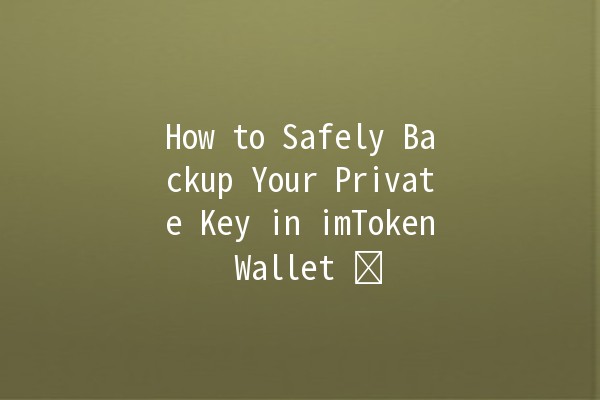Backing up your private key in the imToken wallet is crucial for ensuring the security and accessibility of your cryptocurrency assets. If you lose access to your private key, you risk losing your funds permanently. This article guides you through essential techniques to effectively back up your private key while providing valuable insights into optimizing your operational productivity when managing your digital assets.
Before diving into the backup process, it's essential to understand what private keys are and why they are vital for your digital wallet.
A private key is a cryptographic code that allows you to access your cryptocurrency. Just as you wouldn’t want to lose the key to your physical safe, losing your private key means losing access to your digital assets. Unlike passwords, if someone gains access to your private key, they can transfer your assets without your consent.

Ownership: Only you should hold your private key.
Security: Ensure your private key is stored securely and is not shared with anyone.
Accessibility: Backup methods should guarantee that you can easily recover your keys without excessive complications.
Here are five specific techniques that enhance productivity and security when backing up your private key in the imToken wallet:
Explanation: Hardware wallets, like Ledger or Trezor, provide an offline method of storing your private keys, making them less vulnerable to internet attacks.
Application Example:
If you own an imToken wallet, after downloading the app and creating your wallet, transfer your private key to a hardware wallet. This way, even if your device is compromised, your keys remain safe offline.
Explanation: Having multiple physical backups reduces the risk of loss due to theft, fire, or accidental damage.
Application Example:
Write down your private key on multiple pieces of durable paper. Store one copy in a home safe, another in a safety deposit box, and consider giving a trusted family member a copy.
Explanation: For those who prefer digital backup, consider using encrypted storage solutions that offer added security, such as Google Drive with encryption or dedicated encrypted USB drives.
Application Example:
Save your private key in a text file and encrypt it using software like VeraCrypt. Store the encrypted file on your Google Drive. Ensure you enable twofactor authentication on your Google account for added security.
Explanation: Regular updates to your software can help protect your private keys from known vulnerabilities.
Application Example:
Regularly update your imToken wallet and any backup applications you use. Check for updates weekly and install them promptly to address any security concerns.
Explanation: Phishing scams can trick you into revealing your private key. Being able to recognize common tactics can protect your assets.
Application Example:
Always verify the URL of websites and emails that request your private key. For example, if you receive an email claiming to be from imToken, do not click links directly. Instead, visit their official website.
Losing your private key means you will lose access to your cryptocurrency assets irretrievably. There's no way to recover lost private keys, which is why creating reliable backups is so important.
While software wallets can be convenient, they are more vulnerable to hacks. It's safer to use hardware wallets for critical storage. If you do use a software wallet like imToken, back it up using the techniques mentioned.
You should back up your private key each time you make significant changes to your wallet, such as adding a new asset. Additionally, perform annual reviews of your backup methods to ensure all copies are intact and uptodate.
Storing your private key on your computer can be risky, especially if it's connected to the internet. If you do choose this method, ensure it is encrypted, and consider using antivirus software to detect potential threats.
Yes, tools like KeePass or Bitwarden can securely store and encrypt your private keys digitally. Furthermore, hardware wallets mentioned earlier are highly recommended as a secure method of storing private keys.
Absolutely not. You must never share your private key. Legitimate services will not ask for your private key for troubleshooting. Always be wary of requests for this sensitive information.
Backing up your private key in the imToken wallet is a fundamental task that every cryptocurrency owner should prioritize. By employing the mentioned techniques and staying informed about security practices, you can effectively protect your digital assets. Remember, the responsibility of safeguarding your private key lies solely on you. Adopting these strategies will ensure that your cryptocurrencies are secure and accessible when you need them.